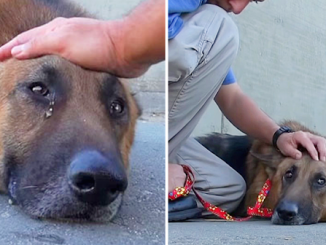Dogs’ brains are sensitive to the familiar high-pitched “cute” voice tone that adult humans, especially women, use to talk to babies, according to a new study.
The research, published recently in the journal Communications Biology, found “exciting similarities” between infant and dog brains during the processing of speech with such a high-pitched tone feature.
Humans tend to speak with a specific speech style characterised by exaggerated prosody, or patterns of stress and intonation in a language, when communicating with individuals having limited language competence.
Such speech has previously been found to be very important for the healthy cognitive, social and language development of children, who are also tuned to such a high-pitched voice.
But researchers, including those from the Eötvös Loránd University in Hungary, hoped to assess whether dog brains are also sensitive to this way of communication.
In the study, conscious family dogs were made to listen to dog, infant and adult-directed speech recorded from 12 women and men in real-life interactions.
As the dogs listened, their brain activities were measured using a functional magnetic resonance imaging (fMRI) scan.
The study found the sound-processing regions of the dogs’ brains responded more to dog- and infant-directed than adult-directed speech.
This marked the first neurological evidence that dog brains are tuned to speech directed specifically at them.
“Studying how dog brains process dog-directed speech is exciting, because it can help us understand how exaggerated prosody contributes to efficient speech processing in a nonhuman species skilled at relying on different speech cues,” explained Anna Gergely, co-first author of the study.
Scientists also found dog- and infant-directed speech sensitivity of dog brains was more pronounced when the speakers were women, and was affected by voice pitch and its variation.
These findings suggest the way we speak to dogs matters, and that their brain is specifically sensitive to the higher-pitched voice tone typical to the female voice.
“Remarkably, the voice tone patterns characterizing women’s dog-directed speech are not typically used in dog-dog communication – our results may thus serve evidence for a neural preference that dogs developed during their domestication,” said Anna Gábor, co-first author of the study.
“Dog brains’ increased sensitivity to dog-directed speech spoken by women specifically may be due to the fact that women more often speak to dogs with exaggerated prosody than men,” Dr Gabor said.

51 DOGS RESCUED FROM THE DOG MEAT TRADE IN VIETNAM

Dr. Katherine Polak, Head of Stray Animal Care Southeast Asia for FOUR PAWS
The dog meat trade is big business in Vietnam and threatens the lives of millions of dogs every year, many of them pets. Every day, pets are violently snatched off the streets, from yards, and even while out on a walk with their owners. These unlucky dogs make a brutal journey to slaughterhouses, markets, and restaurants, where a gruesome death awaits them. But times are changing, and the brutality and illegality of pet theft is no longer being tolerated by Vietnamese authorities.
In a landmark case, police in Thanh Hoa Province received a tip off regarding a gang of dog thieves believed to have stolen thousands of dogs since the beginning of the year. On September 15, 2019 the police successfully carried out the largest ever bust of a dog theft ring in Vietnam, resulting in the seizure of 51 dogs. According to the police, the gang carried stun guns and other sharp weapons, and rode motorbikes through residential areas late at night shooting dogs roaming outside. Police arrested a total of 16 suspected gang members and questioned more than 40 suspects. The gang not only brutalized neighborhood dogs, but also caused outrage among local people, particularly pet owners.
Following the interception, Police struggled to properly care for the confiscated dogs given their limited capacity for animal care, so the Asia Canine Protection Alliance (ACPA), of which FOUR PAWS is a member, stepped in to offer assistance. There were 13 dogs in need of immediate medical care due to severe wounds sustained during capture. Dogs with painful open wounds were anaesthetised, treated, provided pain medication and antibiotics, and housed in a temporary shelter for ongoing treatment.
The Asia Canine Protection Alliance is an international alliance of four animal protection organizations committed to ending the illegal trade of dogs in Vietnam: FOUR PAWS, Animals Asia, Humane Society International, and Change for Animals Foundation. ACPA is working to build collaborative relationships with the governments throughout Southeast Asia where the dog meat trade is prevalent, and has already secured a moratorium on the trade in dogs between Thailand and Vietnam.
Following the confiscation, the police publicised the bust throughout the province using local media so that stolen dogs could be reunited with their families.
Over the course of 2 weeks, all 51 dogs were successful reunited with their owners, who were devastated by their pets’ disappearance.
This bust pets a major precedent as dog theft is rarely treated as a criminal offense in Vietnam unless the canines are valued at more than VND2 million ($86).
“These arrests will hopefully go a long way in deterring future dog theft in Thanh Hoa Province, and potentially throughout all of Vietnam. While the dog meat trade is often defended as ‘culture’ or ‘tradition’, the reality is that there are significant health and societal impacts associated with the trade and these are becoming of ever-growing concern within Vietnam and internationally.”

Earlier in the week, the Food Safety Management Board of Ho Chi Minh City urged locals to stop eating dog meat in an effort to improve Vietnam’s national image with tourists. They also warned the local community of the health risks posed by consuming the unregulated meat. This followed a similar call by the Hanoi People’s Committee last year.
In addition to membership in ACPA, FOUR PAWS also runs a ‘Cats Matter Too program‘ in Central Vietnam with local charities PAWS for Compassion and Vietnam Cat Welfare to improve veterinary training, animal welfare education, and provide free spay/neuter services.



Leave a Reply